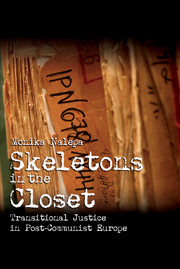Book contents
- Frontmatter
- Contents
- List of Figures
- List of Tables
- Acknowledgments
- List of East Central European Political Organizations
- 1 INTRODUCTION
- Part I Skeletons in the Closet
- 2 COMMITTING TO AMNESTY
- 3 THE KIDNAPPER'S DILEMMA
- 4 HOSTAGES AND SKELETONS IN POLAND, HUNGARY, AND THE CZECH REPUBLIC
- Part II Out of the Closet
- 9 EPILOGUE: BETWEEN AGENTS AND HEROES
- Appendix A Mathematical Proofs to Chapter 3
- Appendix B Answers of MPs and Their Constituents to “More Should Be Done to Punish People Who Were Responsible for the Injustices of the Communist Regime”
- Appendix C Sampling Technique and Transitional Justice Survey Questionnaire
- Appendix D Birth and Death of Parliamentary Parties by Their Position Regarding Lustration
- Appendix E Mathematical Proofs to Chapter 7
- Appendix F Lustration Laws by Target, Targeted Activity, and Sanction Type in Poland, Hungary, and the Czech Republic
- Bibliography
- Index
- Titles in the series
4 - HOSTAGES AND SKELETONS IN POLAND, HUNGARY, AND THE CZECH REPUBLIC
Published online by Cambridge University Press: 05 June 2012
- Frontmatter
- Contents
- List of Figures
- List of Tables
- Acknowledgments
- List of East Central European Political Organizations
- 1 INTRODUCTION
- Part I Skeletons in the Closet
- 2 COMMITTING TO AMNESTY
- 3 THE KIDNAPPER'S DILEMMA
- 4 HOSTAGES AND SKELETONS IN POLAND, HUNGARY, AND THE CZECH REPUBLIC
- Part II Out of the Closet
- 9 EPILOGUE: BETWEEN AGENTS AND HEROES
- Appendix A Mathematical Proofs to Chapter 3
- Appendix B Answers of MPs and Their Constituents to “More Should Be Done to Punish People Who Were Responsible for the Injustices of the Communist Regime”
- Appendix C Sampling Technique and Transitional Justice Survey Questionnaire
- Appendix D Birth and Death of Parliamentary Parties by Their Position Regarding Lustration
- Appendix E Mathematical Proofs to Chapter 7
- Appendix F Lustration Laws by Target, Targeted Activity, and Sanction Type in Poland, Hungary, and the Czech Republic
- Bibliography
- Index
- Titles in the series
Summary
This chapter uses the main empirical implications derived from the TSI model to explain the variation in the passage of lustration laws observed in Figure 1.1. I start by explaining why I collected data in Poland, Hungary, and the Czech Republic. Next, I discuss the nature of the elite interview data. I talk of its advantages and limitations. The interviews are used in two ways to illustrate the model's results: first in analytic narratives, next in the form of aggregated responses. I illustrate the use of the qualitative data to corroborate one of the assumptions of the skeletons model: namely, that the issue of accountability for past human rights violations was salient during the roundtable negotiations. Next, I derive empirical implications from the skeletons model.
Case Selection
All three countries under investigation here share two important features: Their transitions were final and nonviolent. In fact, even though dubbed “revolutions,” their actual peaceful character earned the intentionally oxymoronic adjectives of “velvet” (Czechoslovakia), “self-limiting” (Poland) (Staniszkis and Gross 1984), and “negotiated” (Hungary) (Bruszt 1990).
The lack of violence in post-communist transitions leaves little room for doubt about their contractual character and makes them suitable for applying the TSI model. The contracting sides entered roundtable pacts voluntarily, not under the threat of force. In the words of Andrzej Garlicki, the author of a famous historical account of the Polish roundtable negotiations: “The roundtable negotiations are a global-scale phenomenon: Without a broken glass or any bloodshed whatsoever, a regime transition took place. Nobody, with perhaps the exception of extreme political optimists, could have foreseen such an unfolding of events” (Garlicki 2003).
- Type
- Chapter
- Information
- Skeletons in the ClosetTransitional Justice in Post-Communist Europe, pp. 58 - 96Publisher: Cambridge University PressPrint publication year: 2010



